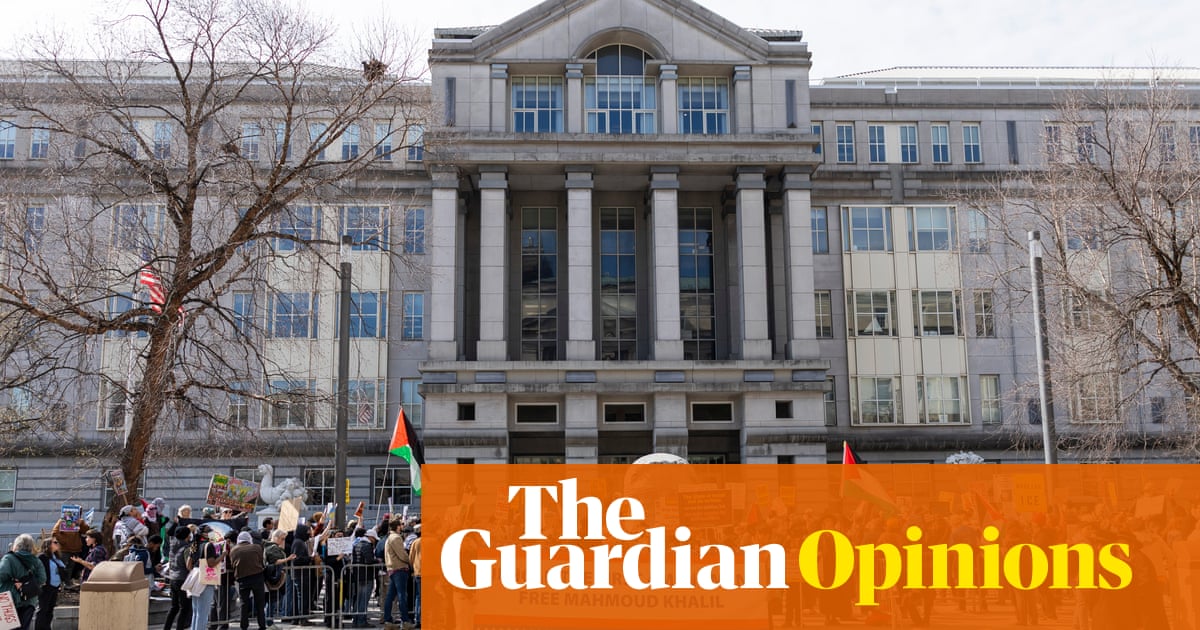When the federal immigration judge Jamee Comans ruled in favor of allowing the government to deport Mahmoud Khalil, a Columbia University student in the US on a legal visa, her decision was based on “foreign policy concerns” presented by US secretary of state Marco Rubio. It was so shocking that I had to reread the news report several times before I could believe it.
Rubio’s claim is based on Khalil’s leadership role in the anti-Israel protests at Columbia University. I didn’t agree with Khalil’s politics when he led the protests and I don’t agree today with his politics, nor even his actions during the protests. But I’m unwavering in supporting his right to his views, and his right to shout them in what, until Trump took the reins, was our free American nation.
As an immigration judge, Judge Comans couldn’t make a constitutional determination. Immigration judges are not actually part of the judicial branch of government; they are part of the executive branch and, as such, don’t rule on constitutional questions but only on issues of immigration law. Therefore, it’s likely – and hopeful – that on further appeal, Khalil’s constitutional right to free speech could be upheld, though less likely than it would have been before the weakening of our constitutional fiber under President Trump.
Since Rubio recently argued that non-citizens, even if here legally, can be deported if they undermine US foreign policy aims, the administration has taken further intimidating action. Today, visa-holders and US visitors are finding their social media being examined and their phones taken at the border for searches.
From the day he entered office, Rubio has shown himself to be a weak link in preserving the national interest, justifying a range of abuses under the guise of US foreign policy. He has completely crouched under the heavy arm of President Trump, foregoing many of his previously long-held beliefs in everything from support for Ukraine to the use of soft aid via USAID, and generally in promoting American values. A child of parents who came to the United States as emigres from Fidel Castro’s Cuba, he once embraced democracy with as much bravado as he is now displaying in helping to sink it.
To claim that one of the reasons for a deportation like this is to stop antisemitism, as the state department says, is really a ruse to garner support for the widening attack on campus free speech and universities. It is certainly not making Jewish students safer. On the contrary, dividing and conquering to strip higher education and free speech of their very essences endangers every group that has relied on the first amendment’s guarantee.
It also strikes me as laughable that the secretary is claiming that Khalil’s presence in America is harming US foreign policy aims. After all, as I wrote here just last week, what in the world is US foreign policy, especially regarding the Middle East? There is no diplomacy and there are no stated foreign policy goals, unless you consider Trump’s dream of building hotel-casinos on Gaza’s beaches to be formal American policy.
As the Israeli PM Benjamin Netanyahu himself discovered when he traveled to the White House this week, Trump had nothing to offer him. Netanyahu came begging for tariff relief and a green light for continuing his war against Hamas, as well as an even brighter green light to bomb Iran. He was shocked when Trump announced during their joint press availability that he would send his adviser Steve Witkoff to discuss a peace agreement between the US and Iran. Netanyahu went home empty-handed on tariff relief, and stunned at Trump’s sudden dive into talks with Iran.
But of course, neither the Gaza beach hotels nor, especially, the deportations of visa-holders are about foreign policy. Everything is about domestic policy; the actual purpose is to pit various groups of Americans one against the other. The memo circulated by Rubio argues that “while Khalil’s activities were otherwise lawful” his presence in the US would harm efforts by those who are implementing “US policy to combat antisemitism around the world and in the United States, in addition to efforts to protect Jewish students from harassment and violence in the United States”.
Rubio went on to claim that “condoning antisemitic conduct and disruptive protests in the United States would severely undermine that significant foreign policy objective”.
What does this even mean? On the same day that Khalil’s freedom was being constricted, Witkoff, the White House adviser, had a four-hour meeting with Vladimir Putin, one of the leading purveyors of antisemitism in the world today. What is this administration’s plan for fighting antisemitism on a global scale? There is none, of course.
Domestically, the president’s plan appears to be not only to divide and conquer, but also to weaken and even cripple institutions of higher education, the arts, and other critical underpinnings of democracy that keep American Jews – and all minorities – safe. Worse still, it is to simultaneously try to make us, American Jews, complicit in his evil dealings.
The ripple effect of this ruling and the detention of other students, like Rümeysa Öztürk from Tufts University, is propelling many of us in the American Jewish community to act against the Trump administration. A new amicus brief filed by a coalition of 27 Jewish organizations, supported with pro-bono work by the law firm of Davis Wright Tremaine (a firm that deserves a gold star for upholding our constitution, rather than making side deals with the president to crush it), says this: “Without presuming to speak for all of Jewish America – a diverse community that holds a multitude of viewpoints – amici are compelled to file this brief because the arrest, detention, and potential deportation of Rümeysa Öztürk for her protected speech violate the most basic constitutional rights.”
Freedom of expression, particularly on matters of public concern, the brief makes clear, is a cornerstone of American democracy and extends to academic settings and campus discourse. I’m proud to say that my synagogue, Congregation Beth Elohim, in Brooklyn, is a signatory of the brief, along with an organization, New Jewish Narratives, where I serve on the board.
Tonight begins the Jewish festival of Passover, a festival of liberation and freedom. It marks a journey that the ancient Jews who were slaves in Egypt took from servitude to freedom. It is a time when Jews around the world proclaim, “Let my people go,” as we see our own fight for freedom in the eyes of those who remain unfree. For me, the freeing of the Israeli hostages is central to the Passover message, as is the freedom of both the Palestinian people and the Israelis to live in a state where they are free from fear and have a vibrant democracy.
It’s a vibrant democracy that I wish, too, for the United States. And, at my Passover table, I will pledge to fight to maintain and strengthen the bonds of all peoples here in the US toward collective action that defends and maintains our democracy. If Khalil’s right to remain in the US is not upheld, our nation will be weaker for it, and all our rights will be further endangered.
-
Jo-Ann Mort, who writes and reports frequently about Israel/Palestine is also author of the forthcoming book of poetry, A Precise Chaos. Follow her @jo-ann.bsky.social

 German (DE)
German (DE)  English (US)
English (US)  Spanish (ES)
Spanish (ES)  French (FR)
French (FR)  Hindi (IN)
Hindi (IN)  Italian (IT)
Italian (IT)  Russian (RU)
Russian (RU)  23 hours ago
23 hours ago
























Comments